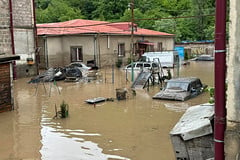
The humanitarian situation in Nagorno-Karabakh was discussed Wednesday at the United Nations (UN) in the context of the risks of atrocity crimes and the preventive mechanisms, informed the Permanent Mission of Armenia to the United Nation.
Attended by delegations representing the UN Security Council Member States and stakeholders of multilateral humanitarian cooperation, the meeting featured presentation of the preliminary report by Former Special Advisor to the Secretary-General on the Prevention of Genocide, Professor of Human Rights Law of the American University (Washington, D.C.) Juan Mendez.
Addressing the meeting, the Permanent Representative of Armenia to the UN Mher Margaryan highlighted that the deliberate infliction of dire humanitarian conditions in Nagorno-Karabakh constitutes an atrocity crime, which is already happening, including through the starvation of an entire population, who are being deprived of their basic human rights. Ambassador Margaryan recalled that, at the emergency meeting of the UN Security Council, which was convened at Armenia’s request on 16 August, the majority of the Council’s member states reiterated the imperative of complying with the ICJ orders and ensuring free and unimpeded humanitarian access to Nagorno-Karabakh.
In his presentation, Professor Juan Mendez briefed the delegations on the origins of the mandate of the Secretary-General’s Special Adviser on the Prevention of Genocide and the entrusted tasks, such as bringing the matters to the attention of the UN Security Council through the UN Secretary-General. Focusing on the prevention duty of the international community, Juan Mendez highlighted that the facts constitute sufficient reason to proffer an early warning to the international community that the population of Nagorno-Karabakh is at risk of suffering “serious bodily or mental harm to members of the group” as defined in Article 2 of the Convention on the Prevention and Punishment of Genocide. “The lack of compliance with a binding interim measure issued by the ICJ to protect a population at risk is at least as severe an early warning than refusal to cooperate with judicial investigations”, Professor Mendez concluded, pointing out to Azerbaijan’s defiance of the legally binding order of the International Court of Justice as an indication that necessitates the exercise of the UN’s early warning and prevention capacities.
The briefing was followed by a discussion, during which Professor Mendez and Ambassador Margaryan reflected on the questions and comments from the delegations.
The aforesaid report is available here.






















